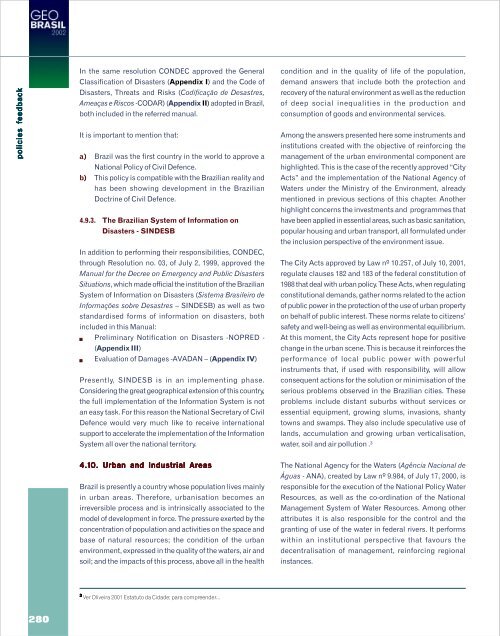GEO Brasil - UNEP
GEO Brasil - UNEP
GEO Brasil - UNEP
You also want an ePaper? Increase the reach of your titles
YUMPU automatically turns print PDFs into web optimized ePapers that Google loves.
policies feedback<br />
In the same resolution CONDEC approved the General<br />
Classification of Disasters (Appendix I) and the Code of<br />
Disasters, Threats and Risks (Codificação de Desastres,<br />
Ameaças e Riscos -CODAR) (Appendix II) adopted in Brazil,<br />
both included in the referred manual.<br />
It is important to mention that:<br />
a) Brazil was the first country in the world to approve a<br />
National Policy of Civil Defence.<br />
b) This policy is compatible with the Brazilian reality and<br />
has been showing development in the Brazilian<br />
Doctrine of Civil Defence.<br />
4.9.3. The Brazilian System of Information on<br />
Disasters - SINDESB<br />
In addition to performing their responsibilities, CONDEC,<br />
through Resolution no. 03, of July 2, 1999, approved the<br />
Manual for the Decree on Emergency and Public Disasters<br />
Situations, which made official the institution of the Brazilian<br />
System of Information on Disasters (Sistema <strong>Brasil</strong>eiro de<br />
Informações sobre Desastres – SINDESB) as well as two<br />
standardised forms of information on disasters, both<br />
included in this Manual:<br />
Preliminary Notification on Disasters -NOPRED -<br />
(Appendix III)<br />
Evaluation of Damages -AVADAN – (Appendix IV)<br />
Presently, SINDESB is in an implementing phase.<br />
Considering the great geographical extension of this country,<br />
the full implementation of the Information System is not<br />
an easy task. For this reason the National Secretary of Civil<br />
Defence would very much like to receive international<br />
support to accelerate the implementation of the Information<br />
System all over the national territory.<br />
condition and in the quality of life of the population,<br />
demand answers that include both the protection and<br />
recovery of the natural environment as well as the reduction<br />
of deep social inequalities in the production and<br />
consumption of goods and environmental services.<br />
Among the answers presented here some instruments and<br />
institutions created with the objective of reinforcing the<br />
management of the urban environmental component are<br />
highlighted. This is the case of the recently approved “City<br />
Acts” and the implementation of the National Agency of<br />
Waters under the Ministry of the Environment, already<br />
mentioned in previous sections of this chapter. Another<br />
highlight concerns the investments and programmes that<br />
have been applied in essential areas, such as basic sanitation,<br />
popular housing and urban transport, all formulated under<br />
the inclusion perspective of the environment issue.<br />
The City Acts approved by Law nº 10.257, of July 10, 2001,<br />
regulate clauses 182 and 183 of the federal constitution of<br />
1988 that deal with urban policy. These Acts, when regulating<br />
constitutional demands, gather norms related to the action<br />
of public power in the protection of the use of urban property<br />
on behalf of public interest. These norms relate to citizens’<br />
safety and well-being as well as environmental equilibrium.<br />
At this moment, the City Acts represent hope for positive<br />
change in the urban scene. This is because it reinforces the<br />
performance of local public power with powerful<br />
instruments that, if used with responsibility, will allow<br />
consequent actions for the solution or minimisation of the<br />
serious problems observed in the Brazilian cities. These<br />
problems include distant suburbs without services or<br />
essential equipment, growing slums, invasions, shanty<br />
towns and swamps. They also include speculative use of<br />
lands, accumulation and growing urban verticalisation,<br />
water, soil and air pollution .³<br />
4.10. Urban and Industrial Areas<br />
Brazil is presently a country whose population lives mainly<br />
in urban areas. Therefore, urbanisation becomes an<br />
irreversible process and is intrinsically associated to the<br />
model of development in force. The pressure exerted by the<br />
concentration of population and activities on the space and<br />
base of natural resources; the condition of the urban<br />
environment, expressed in the quality of the waters, air and<br />
soil; and the impacts of this process, above all in the health<br />
The National Agency for the Waters (Agência Nacional de<br />
Águas - ANA), created by Law nº 9.984, of July 17, 2000, is<br />
responsible for the execution of the National Policy Water<br />
Resources, as well as the co-ordination of the National<br />
Management System of Water Resources. Among other<br />
attributes it is also responsible for the control and the<br />
granting of use of the water in federal rivers. It performs<br />
within an institutional perspective that favours the<br />
decentralisation of management, reinforcing regional<br />
instances.<br />
3<br />
Ver Oliveira 2001 Estatuto da Cidade; para compreender...<br />
280
















